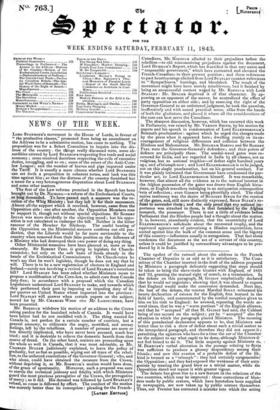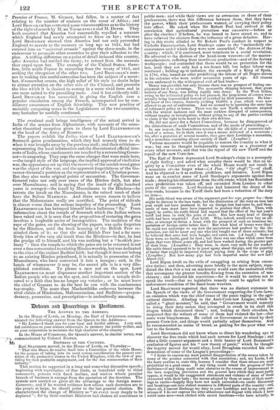NEWS OF THE WEEK.
Loan STANHOPE'S movement in the House of Lords, in favour of "the productive classes," promoted from being an amendment on the Address to be a substantive motion, has come to nothing. The proposition was for a Select Committee to inquire into the dis- tress of the country the things really discussed were, some ab- surdities uttered by Lord STANHOPE respecting free trade and social ,economy ; some received doctrines respecting the evils of excessive duties smuggling, and so on ; some of the errors of the Anti-Corn- ' law League and the number of beeves and pigs imported under the Tariff. It is usually a mere chance whether Lord &armors can set forth a proposition in coherent terms, and luck was this time against him ; so that the distress of the country furnished but a name for a very heterogeneous disputation about Lord STANHOPE and some other matters.
The first of the Law reforms promised in the Speech has been brought out by Dr. Nicacaz—a reform of the Ecclesiastical Courts, ,so long demanded. To have passed such a measure was the vo- cation of the Whig Ministry ; but they left it for their successors. Almost all the support which it received, however, came from the Opposition side : one after another, the Opposition Members rose to support it, though not without special objections. Sir ROBERT Nous was more decidedly in the objecting mood ; but his oppo- sition is not calculated to endanger the bill. Neither is the bitter rancour of the Member for Sibthorp. The useful bearing of the Opposition on the Ministerial measure confirms our old pre- diction, that the Liberals would be far more serviceable to the country when removed from their false position as the followers of a Ministry who had destroyed their own power of doing any thing. Other Ministerial measures have been glanced at, more or less obscurely. Sir ROBERT PEEL is going to legislate for Church- extension ; but only on the safe basis of funds already in the bands of the Ecclesiastical Commissioners. On Church-rates he won't say that he won't legislate, though he does not say that he will. There is to be a new registration of electors in England and Ireland—surely not involving a revival of Lord STANLEY'S notorious bill? Lord STANLEY has been asked whether Ministers mean to propose a modification of the Corn-law, to admit corn from Canada duty-free ; in accordance with a proposal which the Canadian Legislature understood Lord STANLEY to make, and towards which they performed their part by imposing an impeding duty of Sr. per quarter on United States wheat imported into the province : Lord STANLEY will answer when certain papers on the subject, moved for by Mr. Cnearms WOOD vice Mr. LABOUCHBEE, have been presented.
Mr. ROEBUCK withdrew his motion of an address to the Crown asking pardon for the banished rebels of Canada. It would have been better had he not meddled with it. The thing wanted for
Canada is, not pardon for a certain number of convicts, but a general amnesty, to obliterate the angry, mortified, and uneasy feelings, left by the rebellions. A number of persons are more or leas directly implicated, who have never been accused, much less tried ; and it is desirable to relieve the domestic hearth from that source of dread. On the other hand, matters are proceeding upon the whole so well in Canada that it was most advisable, as Mr. Camas Bumant judiciously explained, to leave the policy of gradually, but as fast as possible, wiping out all trace of the rebel- lion, to the unforced convictions of the Governor-General ; vho, and who alone, could have obtained the measure from the Crown, Without depriving it, as Mr. ROEBUCK'S motion would have done, of the grace of spontaneity. Moreover, such a proposal was sure to startle the technical jealousy and fidelity with which Ministers guard the most precious prerogative of the Crown, the prerogative of mercy ; as it did. His demand was followed by Lord STANLEY'S refusal, as cause is followed by effect. The conduct of the motion was scarcely better than its conception : pleading for the French-
Canadians, Mr. B.OEBUCK alluded to their prejudices before the rebellion—to old misconceiving prejudices against the document, Lord DURHAM'S Report, which has fructified in that very union and "responsible government," which have contented and elevated the French-Canadians to their present position ; and these references to past heartburnings elicited from Lord STANLEY counter-references to "Sympathisers," burnings, and bloodshed. The result of the movement might have been merely mischievous, had it finished by
being an unsuccessful contest waged by Mr. ROEBUCK with Lord STANLEY: Mr. BULLER deprived it of that character. By ap- pearing as an opponent of the mover, he neutralized the effect of party opposition on either side; and by asserting the right of the Governor-General to an unfettered judgment, he took the question, inoffensively and with sound practical sense, alike from the hands of both the gladiators, and placed it where all the considerations of the case can best serve the Canadians.
The sharpest discussion, however, which has occurred this week in Parliament, was raised by Mr. VERNON SMITH, by his motion for papers and his speech in condemnation of Lord ELLENBOEOUGH'S Somnath proclamation : against which he urged the charges made by the press when it appeared here ; dwelling mainly on its en- couragement of religious differences and collision between the Hindoos and Mahometans. Mr. BINGHAM BARING and Sir ROBERT PEEL were the Governor-General's defenders ; and their points of
defence are principally these. The sandal-wood gates were re- covered for India, and are regarded in India by all classes, not as religious, but as national trophies—of defeat eight hundred years ago, and of triumph now ; and Lord ELLENBOROUGH is to be judged, not on this single proclamation, but on his general conduct. For it was plainly intimated that Government have condemned the par- ticular act, to Lord ELLENBOROUGH himself. It was remarkable, however, that almost all the evidence as to the national interest in the Afghan possession of the gates was drawn from English histo- rians, or English travellers indulging in an antiquarian retrospective
'vein of reflection ; even GIBBON being plentifully cited. The chief native testimony was the desire of &TWEET SINGH for the cession
of the gates, and, still more distinctly expressed, SHAH Swan's re- fusal to surrender them ; and the only proof that any national im- portance was attached to them, is that furnished by the Afghan monarch, the possessor. There is not a tittle of evidence before Parliament that the Hindoo people had a thought about the matter. It is, however, abundantly evident, that the eccentricity of Lord ELLENBOEOUGH'S solicitude about the recovered trophy, and the equivocal appearance of patronizing a Hindoo superstition, have united against him the bulk of the common sense and the bigotry of this country—influences usually in antagonism. That fact alone condemns the document as the act of a servant of this country, unless it could be justified by extraordinary advantages to be pro- duced by it in India.
The upshot of the turmoil about the address in the French Chamber of Deputies is as odd as it is satisfactory. The Com- mittee of the Chamber inserted in the draft of the address prepared by Ministers a paragraph delicately suggesting that steps should be taken to bring the slave-trade treaties with England, of 1831 and '33, granting the mutual right of search, to a termination. In the debate on this paragraph, M. GUIZOT emphatically declared that he would not negotiate ; showing that_it was absurd to expect that England would make the concession demanded. Next day, the last of the debate, the veteran Marshal SOULT reiterated his hearty declaration of esteem for the English, first learned in the field of battle, and consummated by the cordial reception given to him on his visit to England: he avowed, repeating the words se- veral times, that he was a "warm partisan" of the English alliance, and that he "accepted" all that M. Guizor had said, the Cabinet being of one accord on the subject ; yet he " accepted " also the situation in which the paragraph placed Ministers. The meaning of this paradoxical declaration appears to be, that Ministers saw better than to risk a show of defeat about such a trivial matter as the interpolated paragraph, and therefore they did not oppose it ; permitting the agitators who have for a time the ear of the Chamber on the subject to say what ought to be done, although Ministers cif - not feel bound to do it. The little majority against Ministers dm ( M. BEREYER'S verbal alteration in the passage relating to Syria was sufficient to produce a gloomy despondency among their friends ; and now this evasion of a probable defeat of the likc. kind is treated as a " triumph " : they had certainly outgeneralled the Opposition ; and they had exposed the weakness of their anta., gonists by treating the grand blow as a trivial matter, while tht Opposition dared not repeat it with greater vigour.
The debate has given rise to a new feature in the relations of the two countries, which may be improved : those corrections of blun- ders made by public orators, which have heretofore been supplied by newspapers, are now taken up by public orators themselves. Thus, our Premier has corrected a mistake into which the acting
7 Premier of France, M. GUIZOT, had fallen, in a matter of fact relating to the number of cruisers on the coast of Africa ; and Lord BROUGHAM has corrected some misconceptions as to the history of the right of search by M. DE TOCQUEVILLE and M. Dorm. They both assumed that America had successfully repelled a measure which England had newly attempted to force on her ; whereas Lord BROUGHAM showed that America had not only persuaded England to accede to the measure so long ago as 1824, but had entered into an "universal crusade" against the slave-trade, in the endeavour to persuade other countries to give their adhesion to the plan. A trifling difference on a point of detail induced this country, after America had ratified the treaty, to retract from the measure thus urged upon her. The example of the United States, there- fore, little avails France in retracting from the treaty of 1841, and seeking the abrogation of the other two. Lord BROUGHAM'S man- ner in making this useful correction has been the subject of a sneer : but, if somewhat ornate, the high relief of his style no doubt helps to attract attention on the other side of the Channel, and presents the idea which it is desired to convey in a more vivid form and in one more suited to the prevailing taste. And it has evidently told: Lord Baoucitam has succeeded in giving the English case a popular circulation among the French, accompanied too by con- ciliatory assurances of English friendship. This new practice of amicably comparing notes in the Legislatures of the two countries, may hereafter be usefully continued.



























